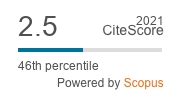An Optimization-Simulation Approach to Chance Constraint Programming
DOI:
https://doi.org/10.5755/j01.itc.47.2.18712Keywords:
Stochastic programming, Simulation, Chance constraints, Heuristics, Scenario generationAbstract
A stochastic programming problem with a number of random parameters in the set of constraints is considered. An iterative optimization-simulation approach is applied as solving method. It consists of two phases: optimization phase, which includes solving a deterministic counterpart of the original chance-constrained problem, and a simulation phase in which the original constraints are checked using Monte Carlo simulation. One iteration corresponds to one scenario. If the decision maker is not satisfied with results, new scenario is generated in which the deterministic values of stochastic parameters are changed in the direction that will provide a more robust solution. Deterministic counterpart in the new scenario is formulated depending on the result of previous iteration. For that purpose, different heuristics are considered. The main goal is to provide a good insight on the optimization problem under uncertainty by performing relatively small number of iterations. General approach and results of the proposed framework will be illustrated on an advertisement placement example.Downloads
Published
2018-05-18
Issue
Section
Articles
License
Copyright terms are indicated in the Republic of Lithuania Law on Copyright and Related Rights, Articles 4-37.





